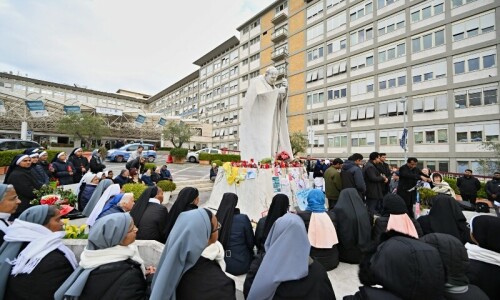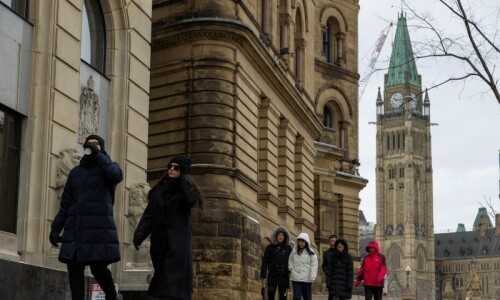
KANDAHAR: Lush green fields hug a canal snaking through the dusty landscape of what was once Afghanistan’s breadbasket, feeding off water from a newly restored dam aimed at tarnishing the lure for farmers to cultivate poppy and help the Taliban.
More than thirty years of warfare and chaos, starting with the Soviet invasion in 1979, has gutted Afghanistan’s farms and food industry, destroying valleys that were once rich with pomegranates, wheat and grapes.
Disgruntled and impoverished farmers in southern Kandahar province, the birthplace of the Taliban and one of the country’s poorest areas, have turned to fighting instead, tempted by the Taliban’s fast cash offer to would-be insurgents.
They also grow opium poppy, a more hardy crop that needs less water than others, making Kandahar one of the top poppy-producing regions in the country, a trade that fuels insecurity through its inseparable links with the Taliban.
“Now people will have work, instead of fighting,” said Energy and Water Minister Ismail Khan, one of Afghanistan’s most prominent politicians and a staunch anti-Taliban crusader.
White-bearded Khan surveyed the vast Dahla Dam, whose newly restored diversion weir was officially unveiled this week by Canada. The Canadians have the sixth-largest force in the Nato-led war in Afghanistan.
“Rehabilitating such dams can actually increase security through finding jobs, and having better harvests,” Khan told Reuters through an interpreter in the baking heat.
Since 2008, Canada has poured $53 million into Afghanistan’s second-largest dam, which is a lifeline for 80 per cent of Kandahar’s 1 million residents, most of whom eke out a living through farming.
More than half a million cubic metres of silt and debris have been cleared from the 74 km-long canal and its dozens of tributaries that stretch from the dam at the mouth of the Arghandab River, properly irrigating the land for the first time in decades.
Canadian officials say last fall’s bumper pomegranate harvest was exported to the United Arab Emirates, and the United Nations credits the dam project for the high-value saffron spice replacing poppy production in Daman, a district of some 30,000.
Mint, grapes, wheat and beekeeping are also being introduced. “The project is to restore the vitality of the agricultural economy of Kandahar, which it had in the past and is recovering as we speak,” said Tim Martin, Canada’s Representative for Kandahar.
Martin added such recovery is also “part of providing people with alternatives to poppy”.
Opium poppy appeal
But the attraction to relatively low-risk poppy, which has flourished in Afghanistan since US-backed Afghan forces ousted the Taliban from power in 2001, will be hard to shake.
Opium, a thick paste derived from poppy plants, is processed into heroin. Ninety per cent of the world’s heroin is sourced from Afghanistan, most of it from the country’s south.
Poppy holds enormous appeal for Afghanistan’s farmers, despite potential government fines for farming something “haram”, or forbidden in Islam, as well as facing the possibility of having one’s crops destroyed.
Its fields require one-sixth of the irrigation needed by a similar-sized area of wheat, and its harvests do not need to be transported or an export market found and established.
Taliban-led militants are believed to derive up to $400 million a year in revenues from production, taxes imposed on farmers, and trafficking of the drug.
Even if alternative crops were to flourish, reliance on poppy will be hard to break without proper anti-drugs legislation and improved security, warns the local United Nations Office on Drugs and Crime (UNODC).
“If those elements are not fulfilled then better irrigation... may have the opposite effect - more opium cultivation,” Jean-Luc Lemahieu, head of the UNODC in Afghanistan, told Reuters.
“Development should not be a ‘Mother Theresa’ scheme but come with conditionality,” he said.
And in a country where violence last year hit its worst levels in an increasingly unpopular war now in its tenth year, the risk of political uncertainty and poor security looms.
The UNODC said last month in a report that 90 per cent of villages in the south of the country with poor security are involved in poppy cultivation.
Though Washington and its allies have backed Afghan President Hamid Karzai’s peace plan, which includes negotiations with the Taliban, there is still little idea how that plan will work, especially without lasting solutions to the poppy problem.













































